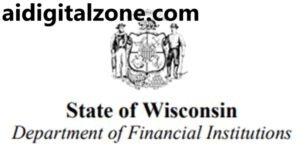Wisconsin Department of Financial Institutions: An Overview
Wisconsin Department of Financial Institution DFI is a state government agency responsible. It is overseeing and regulating a variety of financial services and businesses in Wisconsin. Its goal is to ensure that financial institutions operate fairly and legally. This is protect consumers and promote a stable financial system. This includes managing everything from banks and credit unions to securities and charitable organizations.
In this article take a closer look at what the DFI does how it helps consumers. And businesses, and how it plays a vital role in Wisconsin financial landscape.
What Is the Wisconsin Department of Financial Institutions (DFI)?

The Wisconsin Department of Financial Institutions (DFI) is an important part of the state’s government, ensuring that financial entities, like banks, credit unions, and other financial service providers, follow the laws and regulations designed to protect consumers and maintain the stability of the state’s financial system. The DFI’s work includes licensing, regulating, and examining the practices of these institutions to make sure they are operating in a safe and sound manner.
The DFI also offers services to help consumers, including handling complaints, providing financial education, and ensuring that companies are transparent in their dealings with the public. It serves as a trusted source for financial information and resources across Wisconsin.
Key Functions of the DFI
Wisconsin Department of Financial Institutions DFI has a number of important functions. And responsibilities that help to maintain financial stability in Wisconsin. Some of the key roles of the DFI include:
-
Regulating Financial Institutions
One of the DFI’s primary responsibilities is to regulate financial institutions in the state. This includes banks, credit unions, savings associations, and other financial service providers. The department makes sure that these institutions follow state and federal laws, and that they maintain proper financial practices to ensure their customers’ money is safe.
DFI staff regularly conducts examinations and audits to check that these institutions are financially healthy, complying with regulations, and properly managing customer funds.
-
Licensing and Registering Businesses
The DFI also manages the licensing and registration of various businesses that provide financial services. This includes mortgage brokers, payday lenders, and investment advisers. By issuing licenses, the DFI ensures that only qualified and trustworthy professionals are allowed to operate within the state.
This process helps consumers work with companies that follow ethical practices.
-
Consumer Protection
A major focus of the DFI is to protect Wisconsin residents from financial fraud and deceptive business practices. The department works to ensure that financial services companies follow ethical business practices and comply with consumer protection laws.
If a consumer has an issue with a financial institution or believes that they have been treated unfairly, they can file a complaint with the DFI. The department will investigate the complaint and work to resolve the issue. The DFI also educates consumers about their financial rights, helping them make informed decisions.
-
Financial Education
The DFI provides educational resources to help Wisconsin residents better understand personal finance, banking, and investing. This is particularly important for young people, seniors, and anyone who might be unfamiliar with financial matters. The department offers information on topics like saving, budgeting, managing debt, and avoiding financial scams.
By promoting financial literacy, the DFI helps residents make better financial choices and build a more secure financial future.
-
Monitoring Securities and Investments
The DFI also plays a key role in regulating the securities industry in Wisconsin. This includes overseeing the buying and selling of stocks, bonds, and other investments. The department ensures that financial professionals and firms dealing with investments follow the rules and disclose necessary information to investors.
This helps ensure that investors have the information they need to make sound investment decisions.
-
Ensuring Charitable Organizations Are Legitimate
The DFI is responsible for overseeing charitable organizations and ensuring they are operating legally and ethically. It checks that charitable organizations are using donations for their intended purposes and not engaging in unethical practices.
The department provides resources for individuals who want to verify the legitimacy of a charity before making a donation.
How the DFI Benefits Consumers
The DFI benefits consumers in many ways by ensuring the financial services industry is safe, transparent, and trustworthy.
Consumer Complaints: If you have an issue with a financial institution, you can file a complaint with the DFI. The department will investigate the matter and work to resolve the situation.
Consumer Education: The DFI offers educational materials on topics like budgeting, saving, managing debt, and avoiding scams. This helps consumers make better financial decisions and avoid common mistakes.
Regulating Financial Businesses: By licensing and regulating financial institutions, the DFI ensures that businesses operate fairly and provide services that meet high standards.
How the DFI Helps Businesses
The DFI also plays a crucial role in supporting businesses. It provides a framework for businesses to operate legally and efficiently within the state of Wisconsin. By licensing businesses, offering resources, and ensuring compliance with regulations, the DFI helps businesses succeed while protecting consumers.
Conclusion
The Wisconsin Department of Financial Institutions plays a critical role in maintaining the stability and safety of the state’s financial system. By regulating financial institutions, protecting consumers, promoting financial education, and overseeing investments and charitable organizations, the DFI helps create a trustworthy financial environment for everyone in Wisconsin. Whether you’re a consumer looking for financial guidance or a business seeking to comply with state regulations, the DFI is a valuable resource that helps ensure fair, ethical practices in the state’s financial sector.
Also Share: Secure Data Transfer Methods
